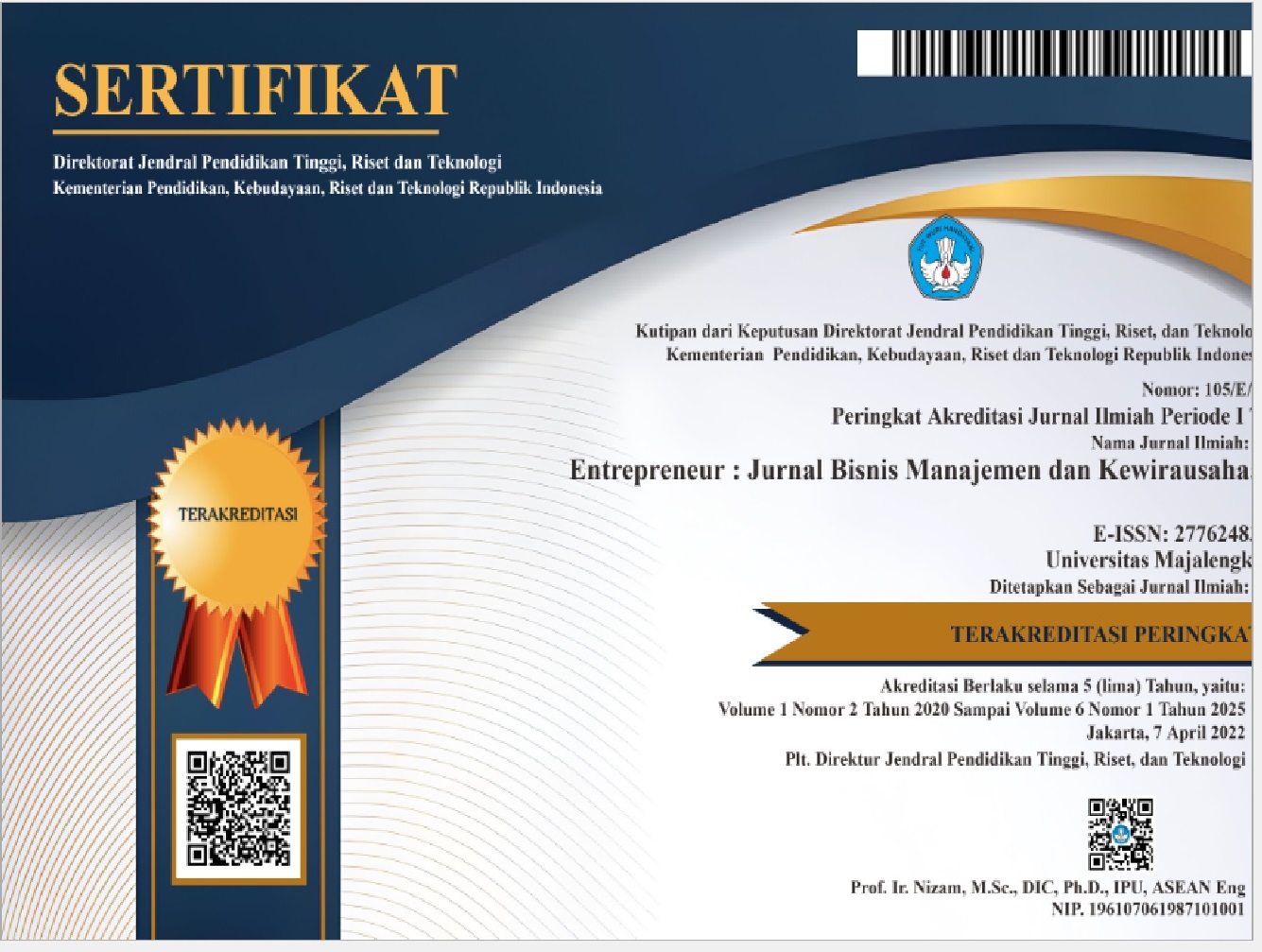PENGARUH ETIKA KERJA, PENGALAMAN KERJA DAN BUDAYA KERJA TERHADAP PRESTASI KERJA KARYAWAN PT. BERAU AGROTECH CIHAUR
DOI:
https://doi.org/10.31949/entrepreneur.v4i1.3712Abstract
This research was conducted at PT. Berau Agrotech Cihaur which aims to determine the effect of work ethics, work experience and work culture on work performance of employees of PT. Berau Agrotech Cihaur. The problem that the author raises is whether work ethics, work experience and work culture have a significant partial and simultaneous effect on employee performance..
The method used in this study is a survey method with a descriptive analysis approach and verification. Collecting data by distributing questionnaires to respondents. The population in this study are employees of PT. Berau Agrotech Cihaur, with a total sample of 45 people. The sampling technique used is the non-probability sampling method. Analysis with a classical assumption test, multiple linear regression analysis, coefficient of determination and hypothesis testing ( a partial test and a simultaneous test) using SPSS 24 software for windows.
The results of the research that has been carried out show that works ethics, work experience and work culture are in the good category and work performance is in the high category. Partially, it gives the results that work ethic has a positive and significant effect on work performance, work experience has a positive and significant effect on work performance, and work culture has a positive and significant effect on work performance. While simultaneously giving the result that works ethic, work experience and work culture has a positive and significant effect on work performance.
Keywords:
Work Ethics, Work Experience, Work Culture, Employee PerformanceDownloads
References
Ernawan, Erni R.2017. Etika Bisnis. Bandung: Bandung: CV Alfabeta.
Emi Wakhyuni dan Ade anisyah dalimunthe. 2020. Pengaruh etika kerja, pengalaman kerja dan budaya kerja terhadap prestasi kerja pegawai badan kesatuan bangsa, politik dan perlindungan masyarakat kabupaten karo. Jurnal Manajemen Tools. Vol. 12 No.2 Desember
Edy Sutrisno, 2014. Manajemen Sumber Daya Manusia. Jakarta: Kencana Prenada Media Group
Imam Ghozali. 2018. Aplikasi Analisis Multivariate dengan Program SPSS. Edisi Kesembilan. Semarang: Badan Penerbit Universitas Diponegoro.
Mangkunegara, A.A Anwar Prabu. 2015. Manajemen Sumber Daya Manusia. Bandung: PT. Remaja Rosdakarya.
Robbins, Stephen P. 2014. Prinsip Perilaku Organisasi Edisi Kelima. Jakarta: Erlangga.
Siagian, Sondang P, 2013. Manajemen Sumber Daya Manusia, Jakarta: Bumi Aksara
Simorangkir, O.P. 2013. Etika Bisnis, Jabatan Jakarta: PT. Asdi Mahasya.
Sugiyono. 2014. Statistika Untuk Penelitian. Alfabeta. Bandung.
----------- 2016. Metode Penelitian Kuantitatif, Kualitatif dan R&D. Bandung: Bandung: PT.Alfabeta.
Sunyoto. 2014. Manajemen Sumber Daya Manusia Edisi ke 2. Yogyakarta: CAPS.
T. Hani Handoko. 2014. Manajemen Personalia dan Sumber Daya Manusia. Yogyakarta: BPFE-Yogyakarta.
Veithzal Rival dan Ella Jauvani Sagala, 2013. Manajemen Sumber Daya Manusia Untuk Perusahaan, Jakarta : PT. Raja Grafindo Persada

Published
How to Cite
Issue
Section
License
Copyright (c) 2023 Endah Prihartini, Dadang Sudirno

This work is licensed under a Creative Commons Attribution-ShareAlike 4.0 International License.
COPYRIGHT NOTICE
An author who publishes in the Entrepreneur: Jurnal Bisnis Manajemen dan Kewirausahaan agrees to the following terms:
1. Author retains the copyright and grants the journal the right of first publication of the work simultaneously licensed under the Creative Commons Attribution-ShareAlike 4.0 License that allows others to share the work with an acknowledgment of the work's authorship and initial publication in this journal
2. The author is able to enter into separate, additional contractual arrangements for the non-exclusive distribution of the journal's published version of the work (e.g., post it to an institutional repository or publish it in a book) with the acknowledgment of its initial publication in this journal.
3. The author is permitted and encouraged to post his/her work online (e.g., in institutional repositories or on their website) prior to and during the submission process, as it can lead to productive exchanges, as well as earlier and greater citation of the published work







